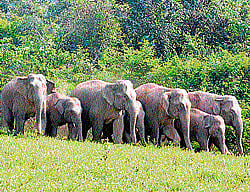
The much debated translocation of elephants from Hemavati backwaters in Hassan district seems to be history now, with the Karnataka Elephant Task Force (KETF) suggesting that the 25 elephants in the region be captured and retained in captivity instead.
The report submitted by the High Court appointed task force has addressed the apprehension of wildlife enthusiasts over translocation of elephants. The panel has suggested that the pachyderms be captured and retained in captivity permanently and that all precautions be taken to minimise trauma while capturing jumbos.
“With the capture of these elephants, the Karnataka Forest department, in consultation with experts, shall install suitable barriers along the boundary of a conservation or co-existence zone, as the case may be, to ensure that there is no further dispersal of elephants into the Alur-Arakalgud region,” the KETF has said in its 145-page report.
Elephant corridor
The task force, headed by pachyderm expert Dr Raman Sukumaran, has said that the recommendations have been made after a site visit, study of available materials and interaction with the affected people. It has termed the proposal to create an elephant corridor in Alur-Arakalagud region ‘not a feasible option.’
“Following the site visits, consultation with local community, examination of forest and revenue records and all available information on elephants and their habitat, we strongly recommend against spending public money on this proposal as it will have little positive impact on elephant conservation, reduce human –elephant conflict marginally and benefit a small section of people and come at a very high cost to the treasury. All this, for a small population of elephants which is in any case disturbed by other factors like development projects,” the report says.
Pointing out that electricity supply companies have repeatedly ignored the requests of the Forest department to raise the minimum height of power transmission pylons by 20 feet in elephant habitats, the task force has requested the High Court to issue directions to supply companies in accordance with the guidelines of National Board of Wildlife.
Post mortem reports
The report suggests that in case of elephant deaths, the post mortem should be conducted in the presence of external observers and the Forest department should create a separate link on its website to upload post mortem reports as done by the National Tiger Conservation Authority.
The task force has also recommended regulation of tourism in elephant habitats by invoking provisions of the Environment Protection Act, 1986. The other recommendations include interstate co-operation and co-ordination in controlling poaching, managing conflict and enhancement of habitat connectivity.
Encouraging research and monitoring of elephant conservation and management, welfare of captive elephants and creation of a Karnataka Elephant Expert Group within State Wildlife Board for conservation are the other recommendations.
